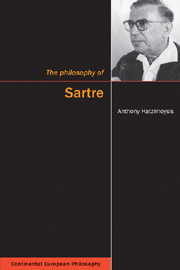2 - Intentionality
Summary
In “Intentionality”, a short article written around 1934, Sartre puts forward the basic thesis of his philosophical outlook: all consciousness is consciousness of something. This apparently innocuous claim will determine some crucial steps in Sartre's argumentation: it informs his theory of the self; it motivates a new way of thinking about emotions; it guides his analysis of imagination; and it grounds his understanding of human existence. In the next four chapters we shall explore each of these issues in its turn. But, first, we need to address something more basic: what exactly does that claim mean?
The claim that all consciousness is consciousness of something gives expression to the doctrine of intentionality, according to which all and only mental states are directed towards something: in thought, towards what is thought; in perception, to what is perceived; in desire, at what is desired. Intentionality is widely acknowledged as a central feature of our mental life. What is original with Sartre is not the endorsement of intentionality but his distinctive way of unpacking that doctrine. The distinctiveness of his approach comes out clearly in his analysis of perceptual experience. In perception the world is directly revealed to us. In looking at a tree, for instance, you do not look at the idea of a tree, or at a picture of a tree, or at some immaterial replica of a tree. You see, touch or climb on objects, not their images.
- Type
- Chapter
- Information
- The Philosophy of Sartre , pp. 11 - 22Publisher: Acumen PublishingPrint publication year: 2011



